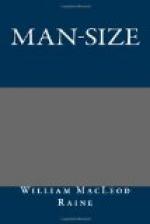They headed into the wilds. The road they made was a crooked path through the white, unbroken forest. They saw many traces of fur-bearing animals, but did not stop to do any hunting. The intense cold and the appearance of the sky were whips to drive them fast. In the next two or three days they passed fifteen or twenty lakes. Over these they traveled rapidly, but in the portages and the woods they had to pack the snow, sometimes cut out obstructing brush, and again help the dogs over rough or heavy places.
The blizzard caught them the third day. They fought their way through the gathering storm across a rather large lake to the timber’s edge. Here they cleared away a space about nine feet square and cut evergreen boughs from the trees to cover it. At one side of this, Morse built the fire while Beresford unharnessed the dogs and thawed out a mess of frozen fish for them. Presently the kettles were bubbling on the fire. The men ate supper and drew the sled up as a barricade against the wind.
The cold had moderated somewhat and it had come on to snow. All night a sleety, wind-driven drizzle beat upon them. They rose from an uncomfortable night to a gloomy day.
They consulted about what was best to do. Their camp was in a poor place, among a few water-logged trees that made a poor, smoky fire. It had little shelter from the storm, and there was no evidence of fair weather at hand.
“Better tackle the next traverse,” Morse advised. “Once we get across the lake we can’t be worse off than we are here.”
“Righto!” assented Beresford.
They packed their supplies, harnessed the dogs, and were off. Into the storm they drove, head down, buffeted by a screaming wind laden with stinging sleet that swept howling across the lake. All about them they heard the sharp reports of cracking ice. At any moment a fissure might open, and its width might be an inch or several yards. In the blinding gale they could see nothing. Literally, they had to feel their way.
Morse went ahead to test the ice, Cuffy following close at his heels. The water rushes up after a fissure and soon freezes over. The danger is that one may come to it too soon.
This was what happened. Morse, on his snowshoes, crossed the thinly frozen ice safely. Cuffy, a step or two behind the trail-breaker, plunged through into the water. The prompt energy of Beresford saved the other dogs. He stopped them instantly and threw his whole weight back to hold the sled. The St. Bernard floundered in the water for a few moments and tried to reach Morse. The harness held Cuffy back. Beresford ran to the edge of the break and called him. A second or two later he was helping to drag the dog back upon the firm ice.
In the bitter cold the matted coat of the St. Bernard, froze stiff. Cuffy knew his danger. The instant the sled, was across the crack, he plunged at the load and went forward with such speed that he seemed almost to drag the other dogs with him.




